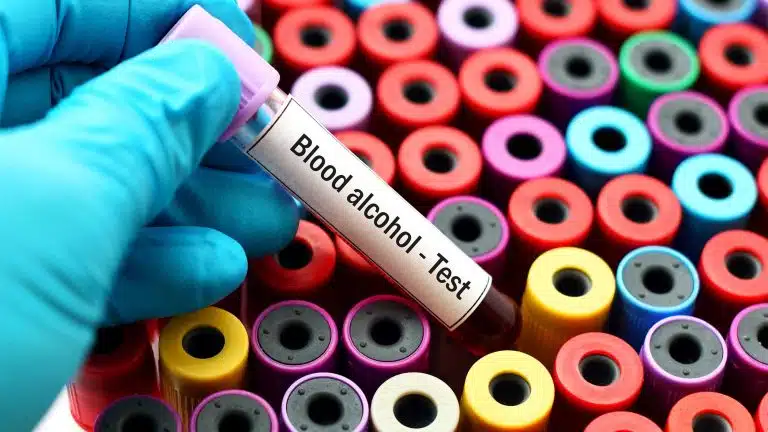Alcohol Blood Tests | How Long Does Alcohol Stay In Your Blood?

Alcohol can stay in your blood for up to 12 hours. Alcohol blood tests can pick up signs of recent alcohol consumption for 6 to 8 hours after your last drink, depending on the test.
Alcohol can stay in other parts of your system for longer than 12 hours, and each person’s body processes alcohol differently. How long alcohol stays in your system can depend on factors such as body fat, the amount of alcohol you drank, and personal genetics.
Alcohol tests can look for alcohol metabolites in your blood, breath, urine, or hair. The accuracy of alcohol tests can be affected by how much time has passed since your last drink, and if you have an empty stomach at the time of the test.
How Alcohol Metabolism Works
It takes about 20 minutes for alcohol to reach the small intestine, where it can be absorbed and metabolized in the body. Alcohol is mostly metabolized in the liver, where various enzymes work to break it down.
Alcohol dehydrogenase (ADH) and aldehyde dehydrogenase (ALDH) are the two main enzymes that break down alcohol. ADH and ALDH break alcohol down into acetaldehyde, acetate, and other metabolites. It takes about 1 hour for an adult man’s liver to break down a standard drink.
Alcohol metabolites stay in the blood for hours after they enter the bloodstream, causing your blood alcohol concentration (BAC) to go up. These metabolites are commonly tested for in many alcohol blood and urine tests.
Types Of Alcohol Blood Tests
There are short-term and long-term alcohol tests.
Short-term alcohol tests can see if you have been binge drinking recently. They can also make sure you are following your alcohol addiction treatment program, by staying sober as directed by your doctors.
Long-term tests might test for long-term effects of alcohol, such as liver disease, inflammation in the digestive system, and signs of an alcohol use disorder.
Ethanol
After your body goes through the process to metabolize alcohol, ethanol is the main ingredient that stays behind. Ethanol can stay in your system anywhere between 1 to 12 hours after your last drink and may be found in blood or urine.
However, the accurate detection window for ethanol in your blood is around 8 hours. After this amount of time, most people can sober up, and it can be difficult to tell if any ethanol in your system is because of alcoholic beverages or other reasons.
Carbohydrate-Deficient Transferrin (CDT)
Carbohydrate-deficient transferrin, or CDT, is a metabolite of ethanol.
CDT tests are often used for patients with an alcohol use disorder, who are going through long-term treatment. CDT tests can estimate how much a patient has been drinking in the last 30 days.
Ethyl Glucuronide (EtG) & Ethyl Sulfate (EtS)
Ethyl glucuronide and ethyl sulfate, or EtG and EtS, are also metabolites of ethanol. EtG and EtS can stay in the blood for about 36 hours after drinking.
EtG and EtS tests are more accurate in patients who drink more alcohol, and who have a higher BAC.
Breathalyzers
A breathalyzer is not a blood test but is instead a breath test for alcohol in your system.
If you have been drinking alcohol recently, ethanol in your breath will react with the solution inside, turning it a specific color. The color can then be matched up with a chart to tell what your BAC probably is.
Breathalyzers may be used by police officers during traffic stops. Breathalyzers may be combined with field sobriety tests, where your reaction time and ability to walk or stand are tested. If you fail these tests, you may be subject to further testing or arrested for a DUI.
Newer or cheaper breathalyzer models may work slightly differently. Breathalyzers are less invasive and quicker than blood tests.
Urine Tests
Once alcohol metabolites leave your bloodstream, they are excreted from your body through urine. Ethanol can stay in your urine for up to 12 hours, while EtG and EtS can stay for up to 36 hours.
Alcohol Tests & Addiction Treatment
Alcohol tests may be used if you are pulled over at a traffic stop, if you are at the hospital for symptoms of alcohol poisoning, or if you are going through an alcohol treatment program.
If you have failed an alcohol test in the past, or are worried about failing one soon, finding treatment may be the right option for you. Treatment programs for alcohol can help you detox, manage withdrawal symptoms, and improve your mental health.
To find a treatment center for alcohol abuse that works for you and your loved ones, please contact us today.
Written by Ark Behavioral Health Editorial Team
©2024 Ark National Holdings, LLC. | All Rights Reserved.
This page does not provide medical advice.
ARUP Consult - Alcohol Use Biomarkers
National Institute on Alcohol Abuse and Alcoholism - Alcohol Metabolism
National Library of Medicine: MedlinePlus - Blood Alcohol Level
The Alcohol Pharmacology Education Partnership - How Does the Breathalyzer Work?
Questions About Treatment?
Ark Behavioral Health offers 100% confidential substance abuse assessment and treatment placement tailored to your individual needs. Achieve long-term recovery.
100% confidential. We respect your privacy.
Prefer Texting?
Our friendly support team is here to chat 24/7. Opt out any time.







 Learn More
Learn More








